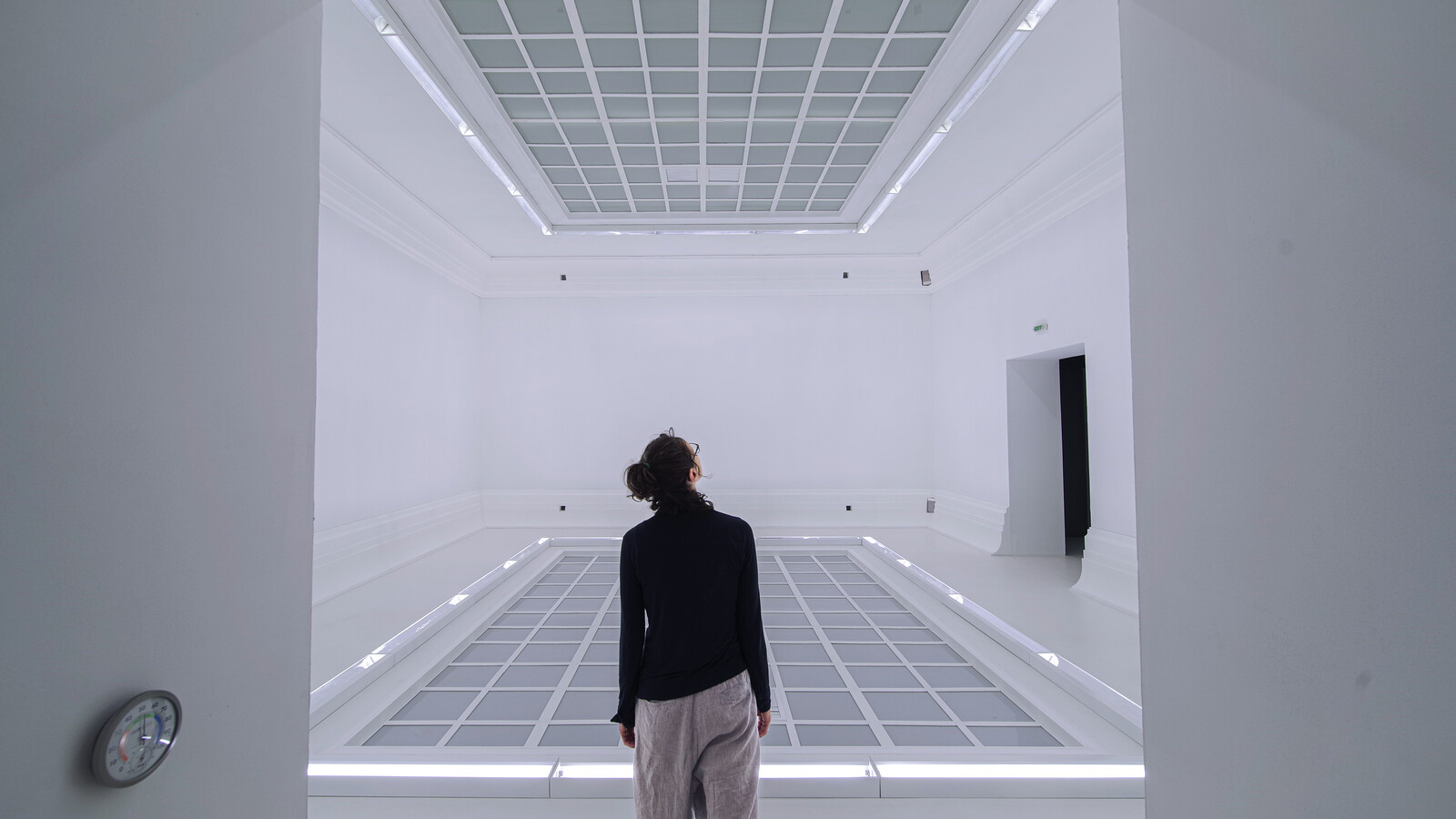Squeezed in Infinity
July 28–September 8, 2023
Mykhaila Hrushevskoho St, 6
Kyiv
01001
Ukraine
The National Art Museum of Ukraine in Kyiv hosts a solo exhibition of the internationally renowned artist Nadia Kaabi-Linke of Ukrainian and Tunisian descent. The project Squeezed in Infinity is about the feeling of an unreachable infinity, narrowing the actual space of action. It expresses a lack of orientation due to a worldview without a horizon and perspective deliberately constructed by idle narratives of eternity and the end of history. It also opens the space for a program of talks, screenings, and exchanges that invites the public to fill the gap with shared feelings and the community’s resonance.
Nadia Kaabi-Linke’s team worked with the NAMU collection for several years. Goethe-Institut Ukraine funded this multidisciplinary research. It resulted in the social sculpture project, Blindstrom, based on Ukrainian artworks that were confiscated and censored by the Soviet Secret Service between the years 1937–1939. Initially scheduled to open in March 2022, the exhibition was delayed due to Russia’s full-scale invasion of Ukraine, when the museum had to evacuate and hide its collection again to survive another war.
The artist, the museum, and the Goethe-Institut decided to use the empty hall for a public program—a series of events that will showcase historically and thematically related movies from the collection of the Dovzhenko Center. Furthermore, it invites contemporary artists from Ukraine and provides the opportunity for exchange.
Next to the eponymous photo series Squeezed in Infinity II, supported by the Arab Fund for Arts and Culture, the site-specific installation Heaven and Hell was created in direct dialogue with the museum’s historical architecture. As the installation was almost finished in early 2022 when Russia invaded Ukraine, the unfinished artwork became a mute witness to the interruption of daily life in Ukraine. Ironically, the installation is about feelings of losing orientation and refers to a museum’s environment that seems “squeezed” by past traumata repeating in the present time.
On September 8, 2023, following the exhibition Squeezed in Infinity in Kyiv, Nadia Kaabi-Linke will open the solo exhibition Seeing without Light at Hamburger Bahnhof - National Gallery for Contemporary Art in Berlin. While martial law in Kyiv prevented the display of Blindstrom in its entirety, she decided to present an altered version in Berlin, reminding the German-Ukrainian history. As the exhibition in Kyiv symbolizes a kind of shock or wake-up moment, the exhibition in Berlin will question dividing narratives that did not allow European people to look into their traumata.
Nadia Kaabi-Linke is a conceptual artist working with different media and based in Berlin. After completing her master’s degree at the School of Fine Arts in Tunis, she received her Ph.D. at the Sorbonne University in Paris. Growing up between Tunisia, Kyiv, and Dubai, her personal history has evolved through migration between cultures and borders, which has greatly influenced her artistic practice. Her work gives a physical presence to non-visible aspects of contemporary societies. Her work has been exhibited and is part of international art collections, including the Museum of Modern Art, New York, Guggenheim Museum, New York, Centre Pompidou, Paris, the Burger Collection Hong Kong, M+ Museum, Hong Kong, Sharjah Art Foundation, UAE, Dallas Museum, TX, USA, and FRAC Pays de Loire, France. She has received numerous prizes, including the lthra Art Prize, Francois Schneider Art Prize, Art Basel Discovery Prize, and the Abraaj Group Art Prize.
The exhibition is curated by Daria Prydybailo, an art historian, curator at Hamburger Bahnhof - National Gallery for Contemporary Art, Berlin, and the founder of the independent cultural institution Art Matters Ukraine.
Goethe-Institut is the official cultural institute of Germany. Since the beginning of the full-scale invasion of Ukraine, it substantially supported partners from culture, education, and civil society by fostering their resilience and enabling them to adapt their activities to the current necessities. The project is part of Goethe-Institut’s facilitation of decolonial practices in Ukraine.



